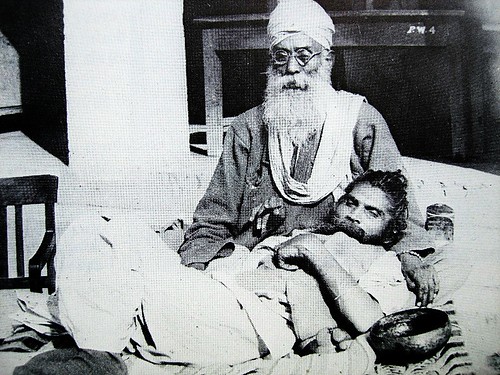
Bhagat Puran Singh Ji with Piara
Daya - Compassion: One is Made of Many
by T. BYRAM KARASU
The historian Joseph Campbell says, "Compassion for me is just what the word says; it is 'suffering with.' It is an immediate participation in the suffering of another to such a degree that you forget yourself and your own safety and spontaneously do what is necessary."
This definition reflects a sympathetic and empathic reaching out to others.
Therefore, compassion is the strongest of all communal glues, adhered with the knowledge that our suffering (as well as our joy) is intimately linked to those same feelings in others; it brings us together.
As one wise rabbi reflected, when it is very cold, there are two ways to warm yourself. One is by putting on a fur coat, the other is by lighting a fire. What is the difference? The difference is that the fur coat warms only the person wearing it, while the fire warms anyone who comes close.
If one's actions are in the service of the self, they bring plain satisfactions, and make one competent at whatever work one does. But if they are in the service of others, they bring a deeper exaltation.
Our civilization's egocentric, competitive notions of inspired actions make us miss their societal service. (Inspiration means simply "inbreathing of spirit," not "exaltation of the spirited.")
Some cultures require their members to seek inspiration for the sake of society.
Examples include Native American sweat lodges, peyote sessions, and dances, or Quaker meetings, whose members gather together to attend the appearance of the indwelling spirit.
Integral to these rituals is the social philosophy that you can best serve yourself when you are in service of others.
Actually, compassion is a reciprocative generosity, although it may seem to benefit only the immediate receiver. It may begin there, but it doesn't end there.
Robert Fulghum tells the story of Menon. When he arrived in Delhi to seek a job in government, all his possessions, including his money and ID card, were stolen at the railroad station. He was totally bereft and would have to return home on foot, penniless.
In desperation, however, he went to see an elderly Sikh for help. He explained his troubles and humbly asked for a loan of fifteen rupees to tide him over until he could get a job.
Without any hesitation, the Sikh gave him the money.
When Menon asked for his address so that he could repay the person to whom he was now indebted, the Sikh replied that Menon owed the debt not to him, but to any stranger who came to Menon in need.
The Sikh explained that help came from a stranger and was to be repaid to a stranger.
T. Byram Karasu, MD is Silverman Professor of Psychiatry at the Albert Einstein College of Medicine, and the author of The Art of Serenity.
[Courtesy: Psychology Today]
From Soul_Jyot ji. Thanks so much ji





